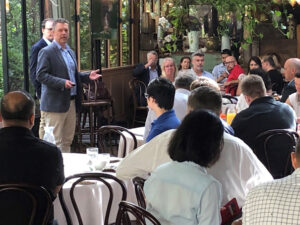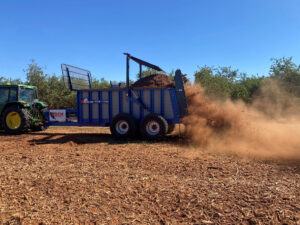
Investments with impact – Hort Innovation update
By Horticulture Innovation Australian
In this article we take a quick look at some of the activities and investments underway at Hort Innovation, including the Australian-Grown Sustainability Framework, a new project to explore almond orchard recycling and the release of Strategic Investment Plan 2017-2021 performance reports.
Horticulture industry unites to firm up sustainability approach
Key decision-makers from the horticulture, technology, transport and retail sectors gathered in Sydney recently to discuss the levers that need to be pulled for the horticulture industry to be more sustainable right now and into the future.
Following on from the release of the Australian-Grown Sustainability Framework last year, the Rural Research and Development Corporation, Hort Innovation teamed up with the International Fresh Produce Association to host an inaugural Horticulture Sustainability Summit to help inform annual reporting against a range of measures.
Hort Innovation General Manager of Stakeholder Experience, Dr Anthony Kachenko, said the Summit marked a shift in industry priorities.
“The Australian horticulture industry is seeing sustainability as a tangible, achievable and necessary part of their businesses,” he said. “10 years ago, sustainability, from environmental management and waste minimisation to workforce development, did not get the same consideration it does today.”
Best-practice approaches already being applied by industry businesses were discussed at the Summit, along with what is working, what is not and how that can be harnessed to create annual sustainability reporting for the industry as a whole.
The information gathered at the Summit will help form part of the Australian-grown Horticulture Sustainability Report, an inaugural reporting document that provides baseline data aligned with the focus areas within The Sustainability Framework. Key focus areas include Nourish and Nurture, People and Enterprise, Planet and Resources, and Less Waste, which consider the United Nations’ Sustainable Development Goals and Hort Innovation’s Hort Frontiers strategic investment funding arm. The report is expected to be complete in October. More information can be found on the Hort Innovation website at www.horticulture.com.au/sustainability
New trial explores almond orchard recycling in Australia
Scientists are working with a Victorian almond grower to trial an orchard redevelopment practice that is reducing the industry’s carbon footprint in the United States. ‘Whole Orchard Recycling’ involves chipping trees and incorporating them into the orchard soil prior to planting new trees. It replaces the traditional practice of burning the trees once they have been removed from the orchard.
The work, which is being delivered through Hort Innovation and led by the South Australian Research and Development Institute (SARDI), the research arm of the Department of Primary Industries and Regions (PIRSA), aims to identify whether Whole Orchard Recycling can achieve similar environmental gains under Australian growing conditions.
The trial is taking place on a farm in Merebin, Victoria, where Whole Orchard Recycling has been applied to close to three hectares of 30-year-old trees. At this age, the orchard’s productivity begins to decline which is a signal to the grower that it needs to be redeveloped.
SARDI Principal Scientist, Paul Petrie, said almond tree trunks, branches and roots accumulate significant amounts of carbon during their lifecycle, and through this project, his team will be looking at ways to harness that carbon.
“We aim to quantify the impact of Whole Orchard Recycling on the carbon footprint of an Australian almond orchard, including the impact on carbon storage and turnover in the soil, soil greenhouse gas emissions and any impacts on the newly planted trees,” he said.
Dr Petrie said researchers will also assess any co-benefits from orchard recycling such as more rapid orchard tree growth, and improved irrigation-use efficiency and soil health.
Trial site owner and long-time almond grower, Neale Bennett, said he had been eyeing the emergence of Whole Orchard Recycling in California, and is keen to test the practice here in Australia.

“There is no doubt that we have an obligation to grow as sustainably as possible and while there is always room for improvement,” he said. “We all want sustainable business models and if that means doing things differently, then I think our industry has a great record for embracing change and innovation.”
Almond Board of Australia (ABA) CEO, Tim Jackson, said the Orchard Recycling trial will add scientific rigour to the benefits Whole Orchard Recycling in Australian conditions. He said it will help with orchard re-development programs and help quantify expectations around carbon farming, changes in soil health, irrigation use efficiency and productivity improvements.
“The recycling results on Californian soils have been widely embraced and are contributing to longer-term aspirations for the industry to become at least carbon neutral,” he said. “Almond growers are all about embracing the most sustainable practices available and this trial is yet another example of that commitment.”
Hort Innovation Head of Research and Development (R&D), Byron de Kock, said a reduction in farm and production waste, and boosting potential water and nutrient use efficiency, have been identified as R&D priorities for the Australian almond industry.
“Almonds are one of Australia’s most lucrative and popular exports, with markets in regions such as Asia, Europe and the Middle East,” he said. “Increasingly, sustainability is at the forefront of horticultural business practice as consumers and investors like to see the sustainability credentials of the products they are buying and investing in, and the almond industry is no exception.”
Strategic Investment Plan 2017-2021 performance reports released
Hort Innovation has recently released reports that review the performance of levy investments against each industry Strategic Investment Plan (or SIP) from 2017-2021. Each industry SIP outlines the key priorities for investment in each levy industry and ensures that investment decisions align with those priorities.
Performance reports for each industry have been developed to demonstrate how Hort Innovation’s investments generated impact for growers over the 2016/17 to 2020/21 SIP period. The reports provide an overview of key achievements delivered through each levy investment, and how they relate to the specific industry’s SIP outcomes and strategies.
The reports provide a useful stock take of how levy funds have been used to deliver against the 2017-2021 SIPs, and offer oversight on which strategies were achieved, are still in progress, or were not achieved and could be considered for future investment.
For more information see Hort Innovation website www.horticulture.com.au.
